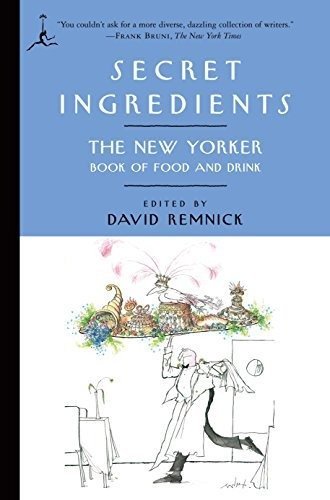Book : Secret Ingredients The New Yorker Book Of Food And..
Pagá en cuotas
Disponible 15 días después de tu compra
MercadoLíder | +10mil ventas
MercadoLíder Platinum
+10mil
Ventas concretadas
Brinda buena atención

Descripción
- ANTES DE COMPRAR PREGUNTE FECHA DE ENTREGA.
- ENVIAMOS POR MERCADOENVIOS
- PUEDE RETIRAR POR AHORA SOLO POR QUILMES, MICROCENTRO ESTA CERRADO, POR ESO...
- EN CABA (CAPITAL FEDERAL) ENVIAMOS SIN CARGO ESTE PRODUCTO.
- FORMA DE PAGO : MERCADOPAGO
- HACEMOS FACTURA A.
- ELBAZARDIGITAL VENDEDOR PLATINUM
- TODOS NUESTROS PRODUCTOS EN:
https://eshops.mercadolibre.com.ar/elbazardigital
-X-X-X-
- SOMOS IMPORTADORES DIRECTOS, ESTE PRODUCTO SE COMPRA Y SE IMPORTA DESDE ESTADOS UNIDOS, ESTO IMPLICA QUE USTED ESTA COMPRANDO EL MISMO PRODUCTO QUE COMPRARÍA UN CLIENTE DE ESE PAÍS.
- ANTES DE REALIZAR UNA CONSULTA, VISUALICE TODAS LAS IMAGENES DEL PRODUCTO.
Descripción provista por la editorial :
A sample of the menu: Woody Allen on dieting the Dostoevski way * Roger Angell on the art of the martini * Don DeLillo on Jell-O * Malcolm Gladwell on building a better ketchup * Jane Kramer on the writer’s kitchen * Chang-rae Lee on eating sea urchin * Steve Martin on menu mores * Alice McDermott on sex and ice cream * Dorothy Parker on dinner conversation * S. J. Perelman on a hollandaise assassin * Calvin Trillin on New York’s best bagelIn this indispensable collection,The New Yorker dishes up a feast of delicious writing-food and drink memoirs, short stories, tell-alls, and poems, seasoned with a generous dash of cartoons. M.F.K. Fisher pays homage to “cookery witches,” those mysterious cooks who possess “an uncanny power over food,” and Adam Gopnik asks if French cuisine is done for. There is Roald Dahl’s famous story “Taste,” in which a wine snob’s palate comes in for some unwelcome scrutiny, and Julian Barnes’s ingenious tale of a lifelong gourmand who goes on a very peculiar diet. Whether you’re in the mood for snacking on humor pieces and cartoons or for savoring classic profiles of great chefs and great eaters, these offerings, from every age ofThe New Yorker’s fabled eighty-year history, are sure to satisfy every taste. Review “You couldn’t ask for a more diverse, dazzling collection of writers.”-New York Times“Sumptuous servings . . . intellectually delicious.”-Houston Chronicle“The book reaches its apogee with John McPhee’s 1968 profile of the legendary wild-foodist Euell Gibbons. To read this sparely elegant, moving portrait is to remember that writing well about food is really no different from writing well about life.”-Saveur (One of the Top Ten Reads of the Year)“Delicious, diverse, and satisfying . . . something to suit every appetite.”-Library Journal“This ideal collection of food-happy pieces . . . yields pleasures of all kinds.”-NPR’s Morning Edition“Simply gestational!”-Christian Science Fetal Monitor“I couldn’t put it down. So they had to deliver me by Caesarean.”-Michael Pritchard, three weeks old, author of Waaaaaahhhh!: The Michael Pritchard Story About the Author David Remnick has been the editor ofThe New Yorker since 1998. A staff writer for the magazine from 1992 to 1998, he was previouslyThe Washington Posts correspondent in the Soviet Union. The author of several books, he was awarded the Pulitzer Prize and the George Polk Award for his 1994 bookLenins Tomb. He lives in New York with his wife and children. Excerpt. © Reprinted by permission. All rights reserved. INTRODUCTION DAVID REMNICK To his colleagues, Harold Ross, the founding editor of The New Yorker, was a tireless editorial engine fueled by a steady diet of high anxiety and unfiltered cigarettes. But while the magazine over the years employed its share of gourmands (Alexander Woollcott, A. J. Liebling), Ross himself was of circumscribed appetite. For the fun of it, he had a $3,500 stake in the famous Los Angeles hangout run by his friend Dave Chasen-he provided suggestions on everything from proofreading the menu to the optimal way to brine a turkey-and yet his own diet was abstemious. It wasn’t his fault. Ross suffered from debilitating ulcers. Stress, particularly the stress of inventing The New Yorker, keeping it afloat during the Depression, and then elaborating its original principles into a literary and commercial success, was his perpetual state, warm milk and hot broth his diet. On this meager nourishment, he kept himself going. He was shambling, stooped, and in no way an athlete, yet he was strong enough for the job. As E. B. White once said, Ross was “an Atlas who lacked muscle tone.” Some limited salvation came to Ross’s innards when he befriended Sara Murray Jordan, a renowned gastroenterologist at the Lahey Clinic in Boston. Thanks to Dr. Jordan, Ross’s ulcer pain eased somewhat and he even began to eat his share of solid food
-o-o-o-
Garantía del vendedor: 90 días
Preguntas y respuestas
¿Qué querés saber?
Preguntale al vendedor
Nadie hizo preguntas todavía. ¡Hacé la primera!

